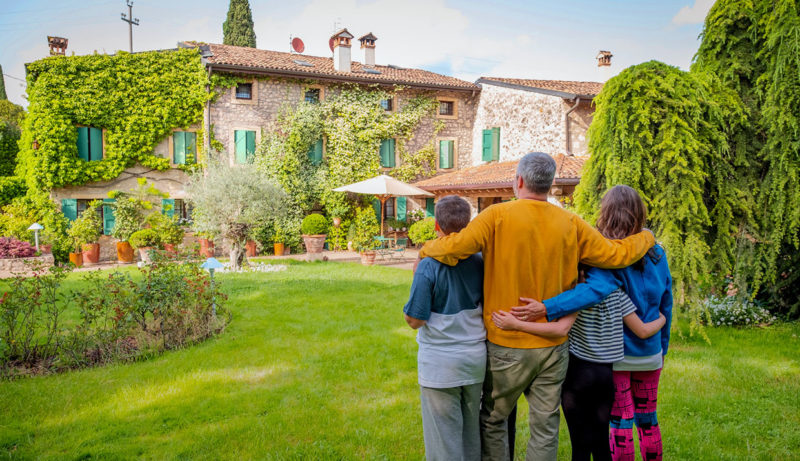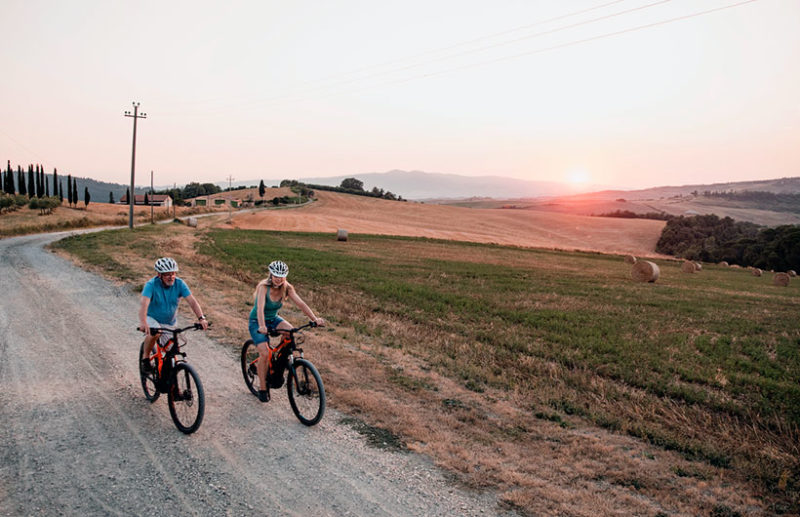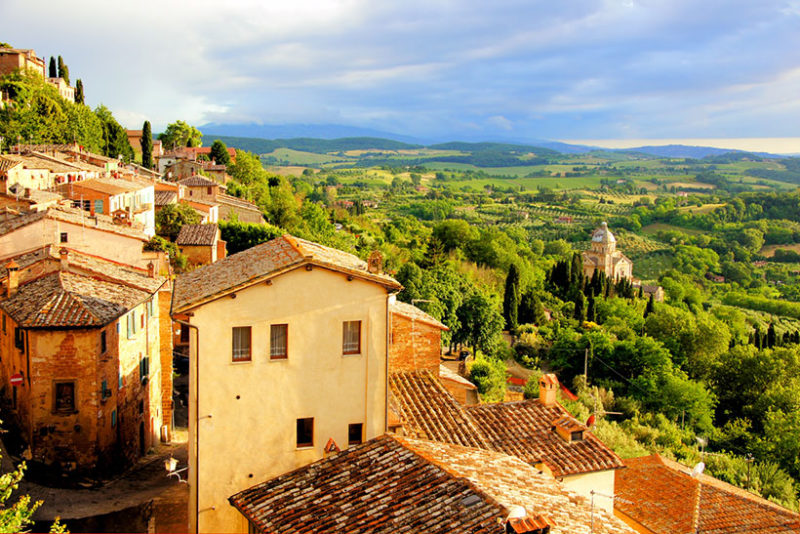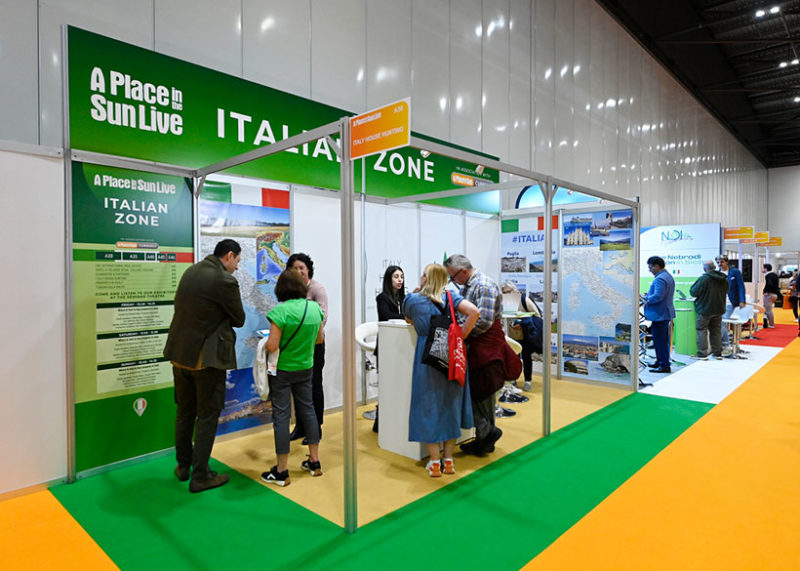Wondering how to buy a house in Italy? The property experts at A Place in the Sun share five top tips for buying your dream home — and why Italy should be top of your list.

There are countless reasons to fall in love with Italy. Beyond the beautiful scenery and enviable lifestyle, there’s world-class architecture, irresistible cuisine, and an incredible variety of regions to choose from.
From beaches and mountains to hilltop towns and historic cities, Italy offers a little of everything, all within easy reach of each other – and the UK.
There is also a broad range of properties to suit most budgets – even homes for as little as €1.
With so much choice, it can be hard to know where to begin.
To help you with where, how, and what to buy, here are five essential tips on purchasing property in Italy.
5 tips on how to buy a house in Italy
1. Location, location, location
Many of us have romantic ideals about the green heart of Italy. Whether it’s the world-famous Tuscany or next-door Umbria, choosing the right location is the essential first step of buying a home in Italy.
In recent years, northern Tuscany has been especially popular for the greater value it offers, along with superb access via Pisa or Florence airports, and to the picture-postcard Ligurian coast.
Other regions also offer beautiful historic hilltop towns, vineyards, and beaches along the Adriatic coast. For the best of both worlds, try Le Marche or Abruzzo.
Fancy skiing or mountain-biking and visiting the coast in one day? You can find mountains in every region of Italy apart from Puglia.
Whilst, of course, there are the romantic lakes and towns of the north (hard to beat for easy access by air, train or car), the sun-drenched south has grown in interest over recent years.
For those on a budget, Calabria has been one of our most searched-for locations. Meanwhile, Puglia is a very special area offering wonderful beaches and olive-grove lined fields between its distinctive masserie – the traditional fortified farmhouses unique to the region.
Bolstered by its starring role in the White Lotus TV series, Sicily has been growing in popularity due to its wealth of elegant baroque buildings and relaxed beach resorts.

2. Follow the simple purchase process
If you’re wondering how to buy a house in Italy, you might be surprised by how straightforward the process can be.
A recent house-hunter from our TV show, who had just completed on an apartment on Lake Garda, could not believe how simple the process of buying a property in Italy was. They found it much less stressful than expected.
Once you find a property you like, you’ll need to make a formal offer, which becomes a legally binding contract.
You’ll typically work with an estate agent and a notary, who will manage the purchase contract and draft the final version. You will need to get a tax code, and the purchase costs are around 10 per cent of the purchase price for a second-hand property, depending on location and whether it’s a primary or secondary home.
You need to allow for taxes, notary fees and estate agent fees. VAT on new homes ranges from 4 to 22 per cent, depending on whether the property qualifies as a primary residence or is classified as a luxury home.
There are also no restrictions on foreign or non-EU buyers in Italy – the process and taxation on purchase are exactly the same as they are for Italians.

3. Know the affordability and costs of buying a house
You can find affordable properties in most regions of Italy.
In 2024, the average search budget for a property in Italy on aplaceinthesun.com was £129,000. That means you really can find a house you might move straight into in most regions – whether Tuscany, Le Marche, Abruzzo or Puglia.
Renovation projects offer the chance to add value or your own stamp – and there are now English-speaking companies that can offer a project-management service for overseas buyers looking for help in restoring or just improving.
Often, estate agents offer this as an arm of their business. Sometimes renovation grants are available (as in Trento, mentioned below).
Purchase tax on resale properties is calculated using the ‘book value’ (a lower government-assessed value), rather than the full sale price. This tax rate is 2 per cent for primary homes and 9 per cent for second homes.
Bear in mind their book value is a lot less than the sales price – some buyers mistakenly think that their buying costs will be higher than the reality.
Outside of the most popular cities, such as Florence, there have not been heavy restrictions on short-term rentals, as seen in Spain. However, if you wish to rent out your home, do check local rules as this may change.

4. Understand the tax benefits of purchasing in Italy
Around 30,000 British people are living permanently in Italy. Although the lifestyle has and probably always will be the main attraction, there are also tax incentives to move to Italy.
So far, Italy’s flat-tax regime has attracted more than 1,100 high-net-worth individuals from overseas. The €200,000 tax per annum has attracted wealthy new residents to cities such as Milan and Rome for their business and education opportunities.
But there are also incentives to move to the less highly populated regions of the centre and south of Italy – retirees can get a 7% flat tax incentive for relocation.
Many Italian towns and villages have launched initiatives to attract new residents and slow their population decline so check for the latest on these – the northern Italian province of Trento is a new one: it’s offering grants to renovate abandoned homes, though eligibility criteria and conditions apply.

5. Get your visa – whatever your property needs
For those without an EU passport, Italy offers a choice of visas for stays of more than 90 days.
Italy offers a digital nomad visa. It requires an annual income of at least €28,000, health insurance, a college degree or equivalent professional experience, and an address in Italy.
The Elective Residency Visa (ERV) is designed for those who can support themselves financially without working (it’s sometimes referred to as a retirement visa). You need to prove an annual passive income of at least €31,000 per person or €38,000 for a married couple.
The Italian Investor Visa – or ‘golden visa’ has also been a gateway for non-EU nationals to obtain residency in Italy. Applicants can choose from four investment routes, from €250,000 in a start-up to €2 million in Italian government bonds
There are also work visas, student visas, family visas and self-employed visas (for entrepreneurs who wish to open a business). Seek advice on which one might suit you best.
Get started at A Place in the Sun Live London this May

Take the first step toward finding your perfect home in Italy by attending A Place in the Sun Live at London’s ExCeL from May 9th to 11th. Hear directly from Italian property experts in the seminar theatre, then meet them one-on-one to discuss every aspect of buying in Italy. You’ll also be able to connect with specialists in legal matters, finance, foreign currency, and relocation services.
In attendance will be Try & Buy Puglia, Roverella Real Estate Italy, C&C International Real Estate and more to be confirmed.
Since many Italian estate agents may not have experience with international buyers, this exhibition is a rare chance to meet English-speaking professionals who understand exactly how to buy a house in Italy as a foreigner.
Don’t miss this opportunity to have the experts guide you smoothly through the process of purchasing your dream home in the Bel Paese.
Get 50% off tickets with code Italia50
If you’re ready to talk more about how to buy a house in Italy, right here in London, book today and claim a 50% discount using the code Italia50 on aplaceinthesunevents.com/london.
Avoid unnecessary hassle with these three ways to avoid property buying mistakes in Italy
